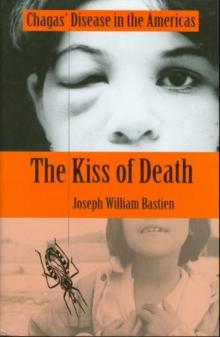The Kiss of Death


Author: Joseph William Bastien
Category: Other3
Published: 1998
Series:
View: 183
Read OnlineChagas’ disease has become one of the major public-health problems in Latin America. Current estimates are that sixteen to eighteen million people are infected. Caused by a flagellate protozoa carried to humans via the bite of the triatomine or vinchuca bug, it is locally referred to as the “kissing bug” because of its tendency to lodge on victims’ faces during sleep. The protozoa enters neuron tissues in the heart and other organs and causes death by irreversible cardiac and gastrointestinal lesions in thirty to forty percent of all cases, usually lying “dormant” until the debilitating chronic phase during the human host’s mid-life. Because of the long dormant phase, it has generally gone unrecognized, with chronic symptoms often attributed to other causes. Originally preying on forest animals, the vinchuca bug has infested the impoverished housing of displaced Andean migrants as forest lands and animals have been destroyed in South America. Although there is no cure for the chronic stage, the disease vectors can be controlled and possibly eliminated through improved hygiene and living conditions. No longer exclusive to Latin America, Chagas’ disease is spreading to North America and Europe with the migration of infected bugs, hosts, transfusions, and transplant organs. The Kiss of Death is a thorough study of Chagas’ disease with analysis of research involving epidemiology, entomology, parasitology, pathology, and immunology. It emphasizes how humans have created environmental and social conditions for its spread; how Andeans have adapted culturally to the disease with changing conceptions of the body, adaptations to rituals, and herbal medicines; what factors are necessary to design a successful intervention project; and why understanding cultural belief systems is critical to prevention programs. The Kiss of Death also shows that traditional cultural forms can provide valuable strategies for dealing with disease prevention and treatment. This first book-length treatment in English reveals that an examination of Chagas’ disease is a warning of what happens as a result of environmental destruction and is an example of what might be done to prevent such tragedies in other parts of the world. [Contain tables. Best viewed with CoolReader.]
 To Win a Wallflower
To Win a Wallflower Conrad (Carrington Book 2)
Conrad (Carrington Book 2) Baller (Heritage Bay Series Book 5)
Baller (Heritage Bay Series Book 5) Apocalyptic Life (Era Series Book 2)
Apocalyptic Life (Era Series Book 2) Boy Scouts Mysterious Signal; Or, Perils of the Black Bear Patrol
Boy Scouts Mysterious Signal; Or, Perils of the Black Bear Patrol Ivyland
Ivyland Crave
Crave Valentine's Wishes
Valentine's Wishes